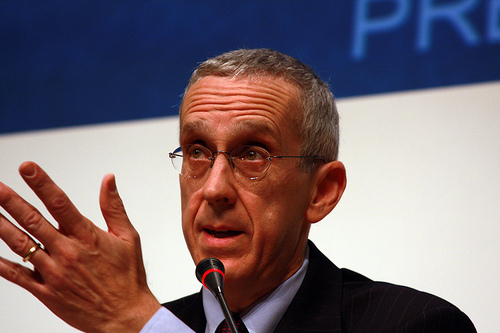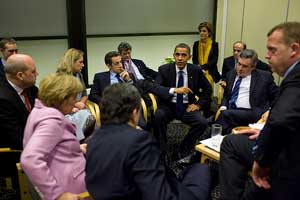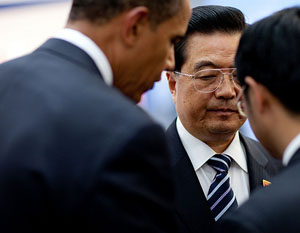
Photo courtesy of US Department of State, <a href="http://www.flickr.com/photos/statephotos/4176289409/">via Flickr</a>.
The United States hosted a meeting with negotiators from the world’s biggest emitters in Washington today, the first since the conclusion of the Copenhagen climate talks last December. While climate envoy Todd Stern said the meeting was “candidate and constructive,” he downplayed expectations for this year’s big climate summit in Cancun, Mexico.
“There is still considerable support for the notion of a legal agreement,” Stern told reporters following the meeting. “I think people would be delighted if that happened this year, but are also cognizant of the notion that might or might not happen.”
The Major Economies Forum, a series of meetings launched by George W. Bush and revived under the Obama administration, brings together big historical emitters like the US and emerging emitters like China, Indonesia, and Brazil. This was the sixth such meeting in the past 14 months; Stern said they may have another one before the next United Nations meeting in November. Stern indicated that the group remains committed to working together and figuring out a path to a new global treaty. “At the least we are going to want to build on the progress made in Copenhagen,” he said.
It’s not entirely clear where world negotiations even stand at this point. At the conclusion of Copenhagen summit, there was no formal UN sign-on to the accord that Barack Obama and several other members of the MEF hammered out because the document was not adopted unanimously. Instead, the UNFCCC only “noted” its existence, and countries were asked to associate themselves with the accord in the weeks after the summit and list their own commitments. So far, 123 countries have associated with the accord, accounting for about 84 percent of the world’s emissions. At least five countries have said they will not engage with the accord (Cuba, the Cook Islands, Ecuador, Kuwait, and Nauru).
At the first United Nations Framework Convention on Climate Change talks of the year, held in Bonn, Germany last week, much of the time was spent trying to figure how to move forward. Stern reaffirmed his desire that the lot the Copenhagen accord “ought to be brought into negotiations” this year. But what exactly that means is not yet clear.











